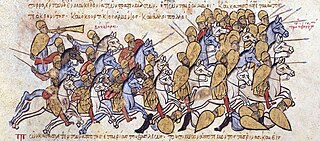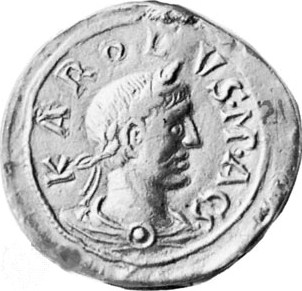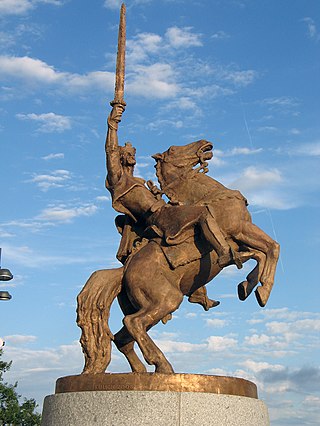Sources
- MacLean, Simon. Kingship and Politics in the Late Ninth Century: Charles the Fat and the end of the Carolingian Empire. Cambridge University Press: 2003.
- Reuter, Timothy. Germany in the Early Middle Ages 800–1056. New York: Longman, 1991.
Engelschalk II was the margrave (comes terminalis, "frontier count") of the March of Pannonia in the late ninth century in opposition to Aribo. In his day, the march orientalis corresponded to a front along the Danube from the Traungau to the Szombathely and Raba rivers and including the Vienna basin.
Engelschalk was the son of Engelschalk I and nephew of William II, sons of William I (the Wilhelminers). He led his brothers and cousins in rebellion against the new margrave Aribo when they were not accorded the succession to their fathers in 871. They displaced Aribo off and on until the Wilhelminer War of 882 – 884, when they were defeated by Aribo and Svatopluk of Moravia, aided by the emperor Charles the Fat. They fled to Arnulf of Carinthia, who refused to hand them over to Svatopluk. When Arnulf became king in 887, Engelschalk probably expected to receive his support, but Aribo was so strongly entrenched by then that the new king did not dare upset the balance.
Sometime before 893, Engelschalk captured Arnulf's illegitimate daughter Ellinrat and, probably, married her, in order to force Arnulf to accede to his demands. His plan failed and he had to flee to Moravia. In 893, Arnulf did regrant Engelschalk some power in Pannonia, but he offended the magnates of Bavaria and they conspired against him. In Regensburg that year, the aristocracy came together to negotiate with Engelschalk and prevent his assisting the Moravians, against whom Arnulf was planning a campaign for that year. Engelschalk was arrested and blinded without Arnulf's knowledge. His brother William immediately connived with Svatopluk, but the Bavarian aristocracy began to purge the court of Wilhelminers.

Arnulf of Carinthia was the duke of Carinthia who overthrew his uncle Emperor Charles the Fat to become the Carolingian king of East Francia from 887, the disputed king of Italy from 894 and the disputed emperor from February 22, 896, until his death at Regensburg, Bavaria.

Year 894 (DCCCXCIV) was a common year starting on Tuesday of the Julian calendar.

Carloman was a Frankish king of the Carolingian dynasty. He was the eldest son of Louis the German, king of East Francia, and Hemma, daughter of a Bavarian count. His father appointed him governor of Carantania in 856, and commander of southeastern frontier marches in 864. Upon his father's death in 876 he became King of Bavaria. He was appointed by King Louis II of Italy as his successor, but the Kingdom of Italy was taken by his uncle Charles the Bald in 875. Carloman only conquered it in 877. In 879 he was incapacitated, perhaps by a stroke, and abdicated his domains in favour of his younger brothers: Bavaria to Louis the Younger and Italy to Charles the Fat.

Charles III, also known as Charles the Fat, was the emperor of the Carolingian Empire from 881 to 888. A member of the Carolingian dynasty, Charles was the youngest son of Louis the German and Hemma, and a great-grandson of Charlemagne. He was the last Carolingian emperor of legitimate birth and the last to rule a united kingdom of the Franks.

Great Moravia, or simply Moravia, was the first major state that was predominantly West Slavic to emerge in the area of Central Europe, possibly including territories which are today part of the Czech Republic, Slovakia, Hungary, Austria, Germany, Poland, Romania, Croatia, Serbia and Ukraine. The only formation preceding it in these territories was Samo's tribal union known from between 631 and 658 AD.

Zwentibold, a member of the Carolingian dynasty, was the illegitimate son of Emperor Arnulf. In 895, his father granted him the Kingdom of Lotharingia, which he ruled until his death.
Aribo was margrave of the Carolingian March of Pannonia from 871 until his death. He is recognised as a progenitor of the Aribonid dynasty.

Svatopluk I or Svätopluk I, also known as Svatopluk the Great, was a ruler of Great Moravia, which attained its maximum territorial expansion during his reign.

Mojmir II was a member of the House of Mojmir and since 894 the last known ruler of Great Moravia. He probably died in the beginning of the 10th century in a battle against the Magyars.

Luitpold, perhaps of the Huosi family or related to the Carolingian dynasty by Liutswind, mother of Emperor Arnulf of Carinthia, was the ancestor of the Luitpolding dynasty which ruled Bavaria and Carinthia until the mid-tenth century.
Braslav was a prince who ruled the Slavs in Lower Pannonia, in a territory located mostly in modern-day Croatia, between 884 and 896 as a vassal of Arnulf of Carinthia. He participated in the Frankish–Moravian War (882–84) and the Frankish invasion of Moravia (891–92). He was last mentioned when he was entrusted Pannonia by Arnulf in order to secure the Frankish frontier against the Hungarians (896), who subsequently overran all of Pannonia and continued into Italy.
The Luitpoldings were a medieval dynasty which ruled the German stem duchy of Bavaria from some time in the late ninth century off and on until 985.
William (II) was the margrave (comes terminalis, "frontier count") of the March of Pannonia in the mid ninth century until his death on campaign against the Moravians in 871. In his day, the march orientalis corresponded to a front along the Danube from the Traungau to Szombathely and the Rába river and including the Vienna basin. It was a military frontier zone against Avaria.
Engelschalk I was the margrave of the March of Pannonia in the mid ninth century until his death on campaign against the Moravians in 871. In his day, the march orientalis corresponded to a front along the Danube from the Traungau to the Szombathely and Raba rivers and including the Vienna basin. It was a military frontier zone against Great Moravia.
Wilhelminer War was a minor war fought in the March of Pannonia from 882 to 884. It was initially a rebellion of the sons of the margraves William II and Engelschalk I, led by Engelschalk II, against the new margrave Aribo. Svatopluk I of Great Moravia intervened as an ally of Aribo because he had been at war with William and Engelschalk when the two died in 871. The "Wilhelminers" were the descendants of William I of the Traungau, father of the two late margraves.

The March of Carinthia was a frontier district (march) of the Carolingian Empire created in 889. Before it was a march, it had been a principality or duchy ruled by native-born Slavic princes at first independently and then under Bavarian and subsequently Frankish suzerainty. The realm was divided into counties which, after the succession of the Carinthian duke to the East Frankish throne, were united in the hands of a single authority. When the march of Carinthia was raised into a Duchy in 976, a new Carinthian march was created. It became the later March of Styria.

The March of Pannonia or Eastern March was a frontier march of the Carolingian Empire, named after the former Roman province of Pannonia and carved out of the preceding and larger Avar March.
The Wilhelminers were a noble Bavarian family of the 9th century. They rose to prominence mid-century under the brothers William and Engelschalk I, sons of William I, the founder of the family. The family held the March of Pannonia until 871, but their possession of it was the cause of a dispute, the Wilhelminer War, with the Aribonids. In the dispute the Wilhelminers had the support of Arnulf of Carinthia and Svatopluk of Moravia.
Saint Arn or Arno von Endsee was the Bishop of Würzburg from 855 until his death. He was a pupil of Bishop Gozbald, who died on 20 September 855; Arn was elected bishop in his place. Arn was a warrior-prelate, recorded fighting against almost every external foe of the Germans at one point or another during his career.
The Aribonids were a noble family of probably Bavarian origin who rose to preeminence in the Carolingian March of Pannonia and the later Margraviate of Austria in the late ninth and early tenth centuries. The dynasty is named after its ancestor Margrave Aribo of Austria. The Aribonids maintained influence in the Duchy of Bavaria, the Austrian march, and other parts of Germany until the early twelfth century, when they disappear.